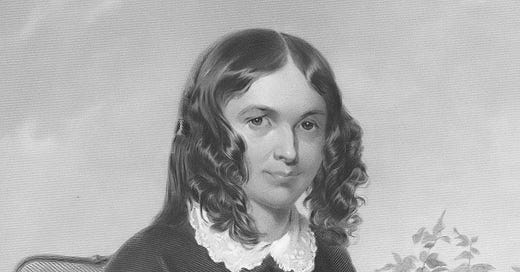As I bring you along with me on my exploration of poetic knowledge, I am finding that I come across quotes, poems, or stories that might not fit well into an article but nonetheless are worthy of sharing. Today I have a poem from Elizabeth Barret Browning’s verse novel “Aurora Leigh”. She artfully shows how the spiritual and physical intermingle together to form the whole of Reality, a Reality that can only be fully known when through it we are led to participation and worship. I dare you to not have chills as you read the last few lines.
A few tips if you are unaccustomed to reading poetry. No matter how many unfamiliar words or names you come across, read it all the way through on your first reading without stopping, and read it aloud. Poetry is meant to be heard. You will likely be surprised how much you get out of it. You might choose to stop there and simply receive what your mind is ready to receive at that point, and that is perfectly acceptable. If you have more time you may choose to go back and read it a second time, looking up unfamiliar words, images, and allusions. But my encouragement would be to never end on this step. Always end by reading it all the way through one last time. Remember, no stopping, and preferably out loud. A poem is a form that is meant to be digested as a whole. Think of it as a spiritual snack, if you will. All that is left after that is to “chew on” the ideas that reverberate in your mind in the minutes and hours after you’ve read it. Or not. Mystically, spiritual food has a way of nourishing a soul far beyond our conscious thoughts of it. So without further ado, may your heart be nourished and blessed!
TRUTH, so far, in my book;—the truth which draws
Through all things upwards,—that a twofold world
Must go to a perfect cosmos. Natural things
And spiritual,—who separates those two
In art, in morals, or the social drift
Tears up the bond of nature and brings death,
Paints futile pictures, writes unreal verse,
Leads vulgar days, deals ignorantly with men,
Is wrong, in short, at all points. We divide
This apple of life, and cut it through the pips,—
The perfect round which fitted Venus’ hand
Has perished as utterly as if we ate
Both halves. Without the spiritual, observe,
The natural’s impossible,—no form,
No motion: without sensuous, spiritual
Is inappreciable,—no beauty or power:
And in this twofold sphere the twofold man
(For still the artist is intensely a man)
Holds firmly by the natural, to reach
The spiritual beyond it,—fixes still
The type with mortal vision, to pierce through,
With eyes immortal, to the antetype
Some call the ideal,—better call the real,
And certain to be called so presently
When things shall have their names. Look long enough
On any peasant’s face here, coarse and lined,
You’ll catch Antinous somewhere in that clay,
As perfect featured as he yearns at Rome
From marble pale with beauty; then persist,
And, if your apprehension’s competent,
You’ll find some fairer angel at his back,
As much exceeding him as he the boor,
And pushing him with empyreal disdain
For ever out of sight. Aye, Carrington
Is glad of such a creed: an artist must,
Who paints a tree, a leaf, a common stone
With just his hand, and finds it suddenly
A-piece with and conterminous to his soul.
Why else do these things move him, leaf, or stone?
The bird’s not moved, that pecks at a spring-shoot;
Nor yet the horse, before a quarry, a-graze:
But man, the twofold creature, apprehends
The twofold manner, in and outwardly,
And nothing in the world comes single to him,
A mere itself,—cup, column, or candlestick,
All patterns of what shall be in the Mount;
The whole temporal show related royally,
And built up to eterne significance
Through the open arms of God. ‘There’s nothing great
Nor small’, has said a poet of our day,
Whose voice will ring beyond the curfew of eve
And not be thrown out by the matin’s bell:
And truly, I reiterate, nothing’s small!
No lily-muffled hum of a summer-bee,
But finds some coupling with the spinning stars;
No pebble at your foot, but proves a sphere;
No chaffinch, but implies the cherubim;
And (glancing on my own thin, veinèd wrist),
In such a little tremor of the blood
The whole strong clamour of a vehement soul
Doth utter itself distinct. Earth’s crammed with heaven,
And every common bush afire with God;
But only he who sees, takes off his shoes,
The rest sit round it and pluck blackberries,
And daub their natural faces unaware
More and more from the first similitude.





Such a beautiful poem! The juxtaposition of contrasting things really carries weight.